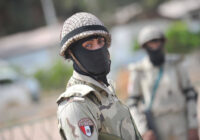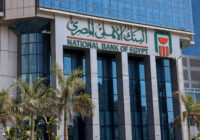On Monday, August 14, Zambian authorities announced the seizure of two planes at Kenneth Kaunda International Airport in the capital, Lusaka. They found one of the planes, recently arrived from Cairo, to be laden with 602 pieces of suspected gold weighing 127.2 kg, as well as five weapons and over $5 million in cash. They detained ten suspects, including nine foreigners, six of whom were said to be Egyptians.
Then, the Ministry of Minerals in Zambia announced that the gold was fake. The ingots were merely gold-plated and contained other metals, mostly copper and zinc. Officials initiated the investigation as one of international fraud. The race to uncover more information about the passengers, plane and cargo then began.
Using open source information, Egyptian independent media outlet Saheeh Masr (“True Egypt”) quickly published an investigation which found that plane is managed — according to Eurocontrol, which specializes in databases of civil and military aircraft — by a company called Flying Group Middle East, which has its headquarters in Dubai.
Arab Digest has often reported in the past on the UAE’s role in smuggling African gold, a trade that funds armed conflict, costs producing countries tax revenue and has significant consequences on public health and the environment.
Saleeh Masr also showed the seized Bombardier BD-700-1A10 Global Express XRS, which was registered in San Marino to an unknown owner, had recently visited Libya and Saudi Arabia at the same time as high level Egyptian security delegations, while other independent media outlets claimed to have also traced the plane’s path to Tel Aviv. A photo emerged of the Egyptian Minister of Interior using the plane on an official visit to Tunisia on 28 February.
Who was detained?
On 17 August, another independent Egyptian fact-checking website, Matsda2sh (“Don’t Believe It”), acquired a copy of a Zambian court document revealing the identities of five of the six Egyptians who had been detained. They were:
— Muhammad Abd al-Haq Muhammad Judeh. US State Departmentarchives show “Abdul-Haq” was an assistant military attaché at
the Egyptian embassy in Washington from 2011 and 2012 while
he was a major in the Egyptian army. He appeared in an
Egyptian TV advertisement for a cancer charity two years ago.
He reportedly retired around five years ago with the rank of
colonel.— Michael Adel Michel Botros. Botros’s passport states he is a
goldsmith, but he has also been involved in producing a movie.
The UK Companies House register lists him as the owner of a
firm called Amstone International Limited. The Amstone
website says Amstone is an Egyptian defense company with
offices in the US, UAE, Egypt, France, Greece, England and
Poland. It also says Amstone is an approved supplier to the
Egyptian Ministry of Defense and claims to provide a very wide
array of advanced military services and hardware, including
aircraft, helicopters, drones and rocket and missile systems.
Speaking at the Egyptian arms fair Edex in 2021, an Amstone
representative said:
We are an Egyptian company with Egyptian capital. We have a partnership with five international companies in the field of military and military manufacturing, in the manufacture of anti-tank missiles and attack drones. We keep pace with the vision of the political leadership in implementing these projects in Egypt with Egyptian hands.
Matsda2sh also reported that Botros was formerly chairman of a
Qatari company called Al Manara Holding. In April 2015 local
and pan-Arab media reported that Al Manara Holding signed
a$6 billion contract to build a luxury development project in
Oman called “Oman Oasis.” At the time, this was billed as “the
largest residential tourist resort in the Sultanat.” However, in
2016 the Omani Minister of Tourism stated that the project was
fictitious.— Mounir Shaker Gerges Awad, aka Al-Khawaja. A jewelry factory
owner and gold trader, Mounir Shaker runs a firm called
“Shaker Gold Factory Genius Gold” with branches in Zagazig
and Cairo, as well as a shop at the Helnan Landmark Hotel in
Cairo’s fashionable Fifth Settlement. On August 7, Mounir
Shaker announced the opening of a new gold shop in Port
Fouad taking place on August 18. On August 16, soon after the
plane was seized, his son announced the opening had been
postponed to August 25 without giving a reason.— Walid Rifaat Fahmy Boutros Abdel Sayed, aka Walid Al-Rubai.
Via an Al-Ahram obituary published in May 2017, Matsda2sh
identified Walid Rifaat Fahmy as a police lieutenant colonel
with an uncle who was a major general in the Ministry of
Interior. He is now thought to be working in the private
security sector.— Yasser Mukhtar Abdul Ghafour Al-Shishtawi. Two former
Egyptian state security officers in exile identified Colonel Al-
Shashtawi as a former commander in the elite Thunderbolt Unit
777 and they posted pictures of him online. Unit 777 is Egypt’s
military counter-terrorism unit and it actively trains with
Western special operations groups including the US Army’s
Delta Force, US Navy’s SEAL Team Six and the French GIGN.
So far, none of the foreigners in the case have formally been charged with any crime. Last Thursday, a French law firm, Vey & Associés, which once represented Julian Assange, issued a statement complaining about their detention and contradicting some important details about the bust as described by Zambian authorities.
Speculation is now rife regarding the identity of the sixth Egyptian national who has been detained. Given the prolonged secrecy, it is widely believed he must be someone extremely important, and opposition media outlets are claiming he has connections to the President Abdel Fattah el-Sisi’s son Mahmoud, deputy head of the Egyptian General Intelligence Directorate.
Friends in high places
Another close Sisi ally who has been linked to the plane is Ibrahim al-Arjani. Last week, Zambian and Egyptian independent media — separately, unofficially and without any confirmation — both named him as the sixth man. Arjani appeared in Egyptian state media last Wednesday however, so this theory has now been discredited.
Nevertheless, many links between Arjani and the Zambia plane have been uncovered, showing that even though he is not the sixth man, he used the plane in the past. In April, Arjani’s son posted a picture of him and his father standing in front of what appears to be the same plane. The plane was also photographed last year at Sharm El-Sheikh Airport, which is in South Sinai.
Born and raised in Sheikh Zuweid in North Sinai, Ibrahim al-Arjani is a wealthy businessman and notorious warlord who heads the Tarabin Bedouin tribe in Sinai. The tribe works closely with intelligence services in Sinai and Gaza. In recent months, he has been allowed to play an increasingly prominent diplomatic function. In May he not only participated in bilateral security talks in Libya, but he chaired some of the meetings. Another sign of his influence came last year when Arjani became the major sponsor of Egypt’s premier football club Al Ahly, a move denounced by the opposition as sportswashing.
According to Haaretz, Egypt is careful that all its reconstruction work in Gaza is done through Arjani’s company — not by the Egyptian army — even if the army is supervising the work. In 2021, Haaretz reported that “Arjani, who owns some of the largest construction firms in Egypt, takes his orders from Egyptian intelligence — and also a big cut of Egypt’s aid to Gaza, and from the movement of goods from Egypt into Gaza, mostly those that pass through the Saladin checkpoint in Rafah.”
A ham-handed cover-up
So far, there has been no official comment from Sisi or any other high-level regime member about the Zambia gold plane, let alone any sign of an investigation or anyone being held accountable.
But while the truth about what was going on remains unknown, top security officials being detained by an African police service with allegedly fake gold, in a plane used frequently by the security services, is a heavy blow to the regime and it is likely to have far-reaching consequences, especially given the acute economic crisis.
State media was obviously not ready for what happened. The Sinai Tribes Union published a hasty denial that neither it nor any Egyptian businessmen were involved in any smuggling. The tweet was deleted a short time later.
At least two other regime websites — Al-Masry Al-Youm and Cairo24 — also took down their articles about the plane a few hours after they were published.
Middle East News Agency published a report asserting that according to “an informed source,” the plane is a “private plane, and it was subject to inspection and ensuring that it meets all safety and security rules.” This was promptly contradicted by the BBC, which said that planes in transit in Cairo are not inspected.
Caught with its pants down, the regime’s anger and humiliation has prompted it to revert to what it knows best: arresting journalists and blaming the Muslim Brotherhood. Just like in the Covid crisis, when the regime turned on doctors, politicians, journalists and other prominent public figures, regime propagandists have attacked Matsda2sh and Sahih Masr as being “affiliated with the Muslim Brotherhood.”
On August 19, Matsda2sh published an urgent press release saying its platform had been subjected to a “coordinated attack” leading to a “serious breach of security.” A day later, two of its journalists were detained in Cairo without charge, before being released on Sunday. The investigation continues.
[Arab Digest first published this piece.]
[Anton Schauble edited this piece.]
The views expressed in this article are the author’s own and do not necessarily reflect Fair Observer’s editorial policy.
Support Fair Observer
We rely on your support for our independence, diversity and quality.
For more than 10 years, Fair Observer has been free, fair and independent. No billionaire owns us, no advertisers control us. We are a reader-supported nonprofit. Unlike many other publications, we keep our content free for readers regardless of where they live or whether they can afford to pay. We have no paywalls and no ads.
In the post-truth era of fake news, echo chambers and filter bubbles, we publish a plurality of perspectives from around the world. Anyone can publish with us, but everyone goes through a rigorous editorial process. So, you get fact-checked, well-reasoned content instead of noise.
We publish 2,500+ voices from 90+ countries. We also conduct education and training programs
on subjects ranging from digital media and journalism to writing and critical thinking. This
doesn’t come cheap. Servers, editors, trainers and web developers cost
money.
Please consider supporting us on a regular basis as a recurring donor or a
sustaining member.
Will you support FO’s journalism?
We rely on your support for our independence, diversity and quality.







Comment